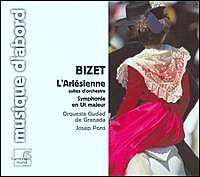|
|
|
Back
12/15/2011
Georges Bizet: L’Arlésienne (Suites n° 1 and n° 2) – Symphony in C major
Orquesta Ciudad de Granada, Josep Pons (Conductor)
Recording: Auditorium of Manuel de Falla, Granada, Spain (1999) – 64’ 57
harmonia mundi # HMA 1951675 – Booklet in French, English and German

   
While a litany of recordings exist in capturing Georges Bizet’s scoring based on the play by Alphonse Daudet, harmonia mundi’s L’Arlésienne is a simple delight. Pairing this orchestral suite alongside the Symphony in C major equate as being the two bookends of the composer’s life supporting the classical and romantic styles.
Those bent with an ear for late 19th century French romantic music will find Gounod’s subtle yet pleasantly pervasive influences winding their way into L’Arlésienne in a demonstrable way via his opera, Mireille (1864): the “Ouverture” (compare to Bizet’s “Carillon” with Provençal chords) and Act II’s opening “Farandole” (compare to Bizet’s “Farandole”) as two examples. The first few bars and repeated ending motif of the “Pastorale” harken back to Tchaikovsky with its broody string introduction. These are calculated with beautiful clarity and refulgent dynamics by the Orquesta Ciudad de Granada. The well known “Farandole” is sharp, evenly-paced and punctuated with a snappy tambourine.
This release retains a conservative verve with underpinnings of melodious runs which are signature Bizet. Equally interesting is the development within Bizet himself in these specific pieces. In the second section of “Pastorale”, one will discern his exotica, bringing us back to his penultimate opéra-comique Djamileh (1872). Pleasantly formulated by the orchestra is the “Menuetto” taken from the composer’s 1867 premiere of La Jolie fille de Perth with the (ironically) heavier instrumented rendition of the Duke of Rothsay/Mab (alias “the woman”) duet from Act III. Although restraints are placed on the harps in L’Arlésienne, the orchestra still maintains a vivid and heightened majestic feel throughout the movement.
Mozartian influences are strongly exuded in the opening segment, “Allegro vivo”, yet Bizet ushers in his own vein of characteristic crescendos and decrescendos alongside a delicately melodic woodwind section. Josep Pons nicely emphasizes the undulations of the oboe with support from an orotund string pizzicato in the symphony’s second “Adagio” movement.
Bizet’s music calls for extremes by way of pianissimo and fortissimo, thereby creating an overall recording challenge, yet harmonia mundi admirably delivers. The interpretative qualities are stellar and unpretentious. Pons delivers an astounding, unembellished and enthralling translation of two of Georges Bizet’s finest respectful compositions. One will appreciate Bizet’s attractive touches even more by listening to the CD with headsets.
Christie Grimstad
|
|
|
Copyright ©ConcertoNet.com